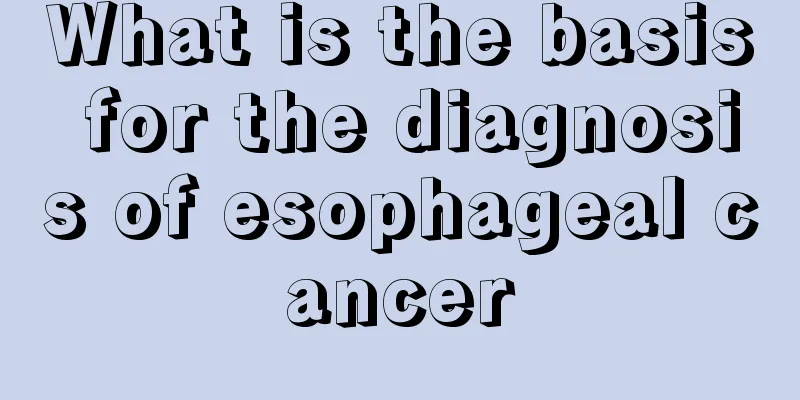What is the basis for the diagnosis of esophageal cancer

|
What is the basis for the diagnosis of esophageal cancer? I believe everyone is familiar with esophageal cancer. The incidence of this disease is very high. With the acceleration of the pace of life, it is getting younger and younger. In order to ensure good health, we should do a good job of prevention and diagnosis in life. So, do you know what is the basis for the diagnosis of esophageal cancer? One of the common methods for diagnosing esophageal cancer is medical examination. When you go to the hospital for treatment, the doctor will first perform an esophageal examination on the patient. Early esophageal cancer can be seen as local mucosal image interruption and weakened peristalsis. When the tumor grows into the lumen, the lumen can be narrowed, the esophageal edge is irregular or has filling defects. When the tumor fills the esophageal lumen, it causes lumen obstruction, the upper part expands, and food accumulates. Fiberoptic esophagoscopy or gastroscopy is a feasible method to check for esophageal cancer. The scope is thin and soft, easy to insert into the esophagus, and painless for the patient. The esophageal cancer can be directly seen under the scope, and tissue can be clamped for pathological examination. If there is any doubt, repeated examinations and cell biopsies can be taken to confirm the diagnosis. In addition, a balloon with a net is swallowed into the esophagus for esophageal cytology examination to check for cancer cells. Cancer cells can be found in 90% of esophageal cancer patients. Disease symptoms are also a common method for diagnosing esophageal cancer, including: 1. The most common symptom is swallowing obstruction, which can disappear or recur on its own and does not affect eating. It often occurs when the patient is emotionally unstable, so it is easily mistaken for a functional symptom. 2. Food retention infection and foreign body sensation When swallowing food or drinking water, there is a feeling of food moving slowly and being retained, as well as a feeling of tightness behind the sternum or food sticking to the esophageal wall, which disappears after eating. The site of symptom occurrence is often consistent with the site of lesions in the esophagus. 3. Pain behind the sternum and under the xiphoid process is more common. Pain behind the sternum or under the xiphoid process occurs when swallowing food. The pain may be burning, pricking or pulling, especially when swallowing rough, hot or irritating food. The pain is intermittent at first, but when the tumor invades nearby tissues or penetrates, there may be severe and continuous pain. The pain site is often not completely consistent with the lesion site in the esophagus. The pain can often be temporarily relieved by spasmolytics. Warm Tips: Through the above introduction, I believe you have some understanding of the diagnosis method of esophageal cancer. If you still have any questions, you can go to a relevant large hospital and ask a relevant doctor. In this way, patients can fully understand esophageal cancer. |
<<: Is it necessary to do esophageal endoscopy to diagnose esophageal cancer?
>>: How to diagnose esophageal cancer?
Recommend
What is the breast cancer red medicine
What is Mercurochrome for Breast Cancer? 1. Durin...
How to treat gingival atrophy?
Gingival atrophy is a common dental disease, and ...
If you shake your head left and right, your neck will make a sound
Nowadays, more and more people suffer from cervic...
What can I eat to cure dry and bleeding stools
Our body's waste is excreted through sweat, f...
What are the dietary taboos for lung cancer patients? Six dietary taboos for lung cancer patients
For lung cancer patients, diet is the most common...
Can seborrheic alopecia be cured?
For the problem of seborrheic alopecia, we need t...
The driving force of pulmonary ventilation is
Pulmonary ventilation in our lives is caused by a...
The benefits of cooking Ganoderma lucidum and black beans together
In our lives, many people pay great attention to ...
Is thyroid cancer not easy to detect?
Thyroid cancer is a relatively common endocrine t...
When does the autumn heat wave occur and what causes it?
When is the autumn tiger? Many people don’t know ...
How to effectively adjust poor sleep during menopause
Women in menopause are prone to poor sleep, which...
Can I use a facial mask during menstruation?
Facial mask is a skin care product that female fr...
People need to have a general understanding of the causes of cervical cancer
Nowadays, cervical cancer is also a common gyneco...
How long can one live with mid- to late-stage kidney cancer
Survival period cannot be generalized. It is reco...
How to eliminate stye in the early stage?
Stye is usually caused by not paying attention to...









